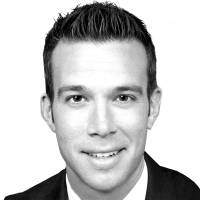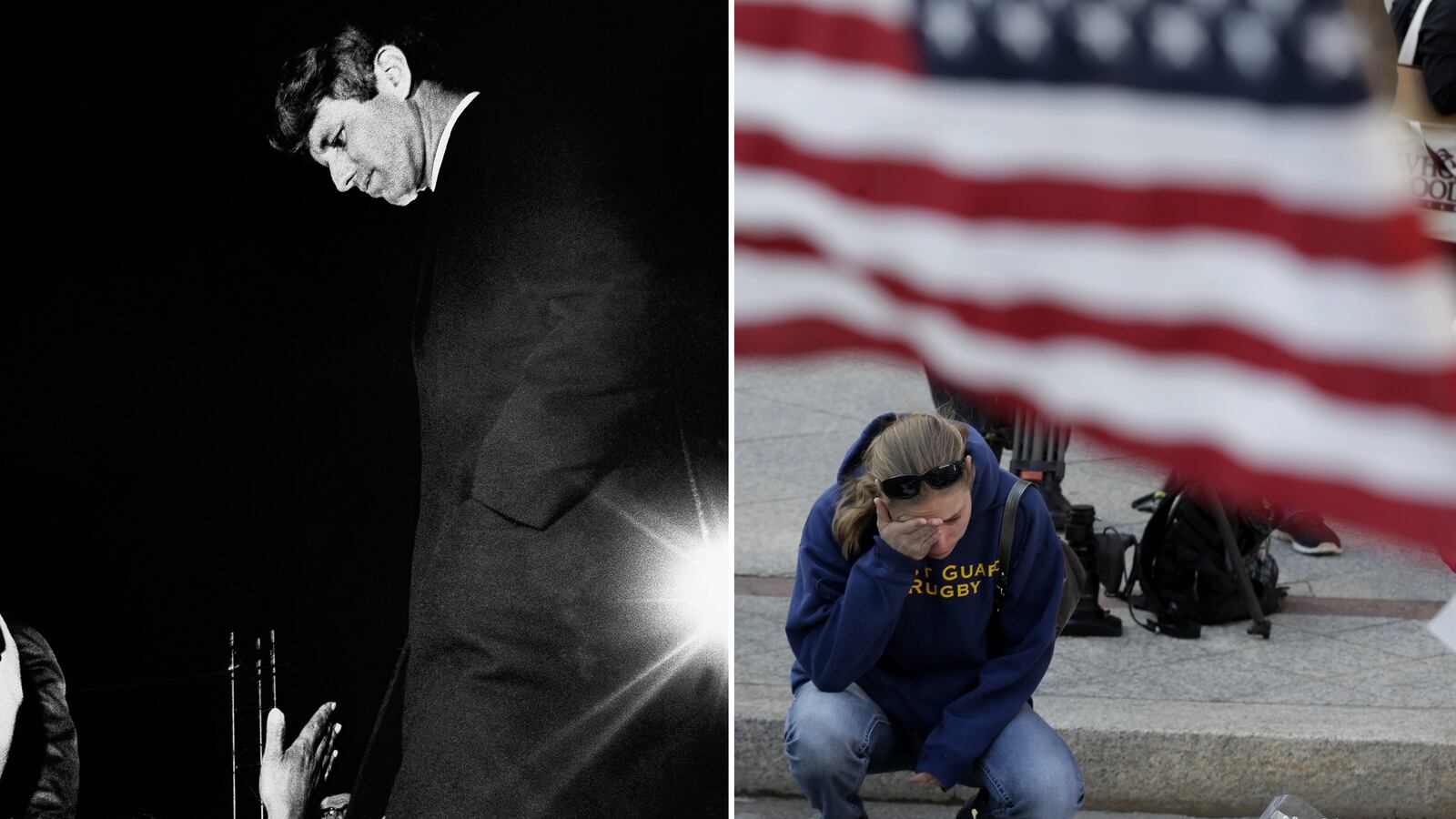Ten years away from Boston, and I’ve never felt farther from home than I did on Monday night. At the White House, the predictable chaos of a last-minute statement would have offered me a welcome connection and distraction all at once. But alone on my couch, comforted by calls and texts from friends and family who were OK, heartbroken by bloody images of spectators who weren’t, all I really wanted was to be there.

The voice that plays in my mind during times like these belongs to a proud son of Boston who was also killed by a horrific act of violence. Forty-five years ago this April, a few short months before being gunned down in Los Angeles, Bobby Kennedy climbed onto a flatbed and ended his extemporaneous eulogy of Martin Luther King Jr. with a simple prayer for the nation:
“We can do well in this country. We will have difficult times. We’ve had difficult times in the past, and we will have difficult times in the future. It is not the end of violence; it is not the end of lawlessness; and it’s not the end of disorder. But the vast majority of … people in this country want to live together, want to improve the quality of our life, and want justice for all human beings that abide in our land.”
There will be a lot of “This Is How We Live Now” and “Shattered Innocence” in the weeks to come. Far more difficult to acknowledge is the fact that evil has always lurked in our shadows. For reasons that most of us may never comprehend, there will always be human beings who choose to inflict pain and suffering and death on other human beings.
We can try to stop certain acts of violence—through nonviolent means, and sometimes war as a last, tragic resort. We can improve our security with new laws and technology. We can put more police on our streets and hire more FBI agents. We can seek help for the mentally wounded, counseling for at-risk youth, and yes, we can prevent dangerous individuals from purchasing deadly weapons with a background check that can take less time than walking through airport security.
But even though our efforts cannot prevent every senseless act of violence in this country—even though we may have to live through more Tucsons, and Auroras, and Newtowns, and Bostons—it does not mean we have to live without faith in humanity. It does not mean we have to live without faith in the ultimate triumph of goodness and love.
Over the last few days in Boston, it is the heroes who have put more runs on the board. The cops and firefighters and frightened citizens who somehow found the courage to run toward the explosion. The emergency-room physician from UMass Memorial who turned a medical tent into a makeshift trauma center, saying, “Everybody was my patient.” The Massachusetts National Guardsmen who had planned to do all 26.2 miles with 40-pound backpacks to honor friends they lost in Iraq and Afghanistan, but stopped along the way to save lives on a battlefield in their own backyard.
There was the former New England Patriots lineman who carried a wounded woman to safety, remembering how bravely his three firefighter brothers had responded on 9/11. The marathoners who ran through the finish line and somehow found the strength to keep going all the way to Mass General Hospital so they could give blood. The hotels and restaurants and families who threw open their doors to out-of-towners who had no other place to stay.
And there was the hero in a cowboy hat. Carlos Arredondo, a 53-year-old Bostonian, arrived at the marathon to hand out American flags on Patriots’ Day—200 altogether—in honor of the young sons he had lost, one of whom was just 20 years old when he died in Iraq. A few hours later, Carlos spared another father from the same pain, using his own hands to put out the fire that had engulfed Jeff Bauman, tearing off his own T-shirt to stop the young man from bleeding out where his legs had been blown off by the bomb. Then Carlos stayed with Jeff, caring for him until the ambulance arrived, when he quietly walked away.
Boston has always been a little rough around the edges. We’re not as glitzy or polished as New York or Los Angeles. We’re not home to as much power or influence as Washington. We’ve never been quite as welcoming as Chicago.
We’re obsessed with our sports teams, but merciless when they disappoint us. We can be a bit provincial in our politics, and ridiculous with our accents (which really are wicked awesome). We even made up our own work-free holiday, Patriots’ Day, which—let’s face it—has always been viewed by most Bostonians as an excuse to start drinking even earlier than usual since the Red Sox start before noon.
So no, we are not perfect people. But we are good people. At this hour, our doctors and nurses and medical professionals are saving the lives of patients from all over the world in the best hospitals on the planet. We welcome students from nearly every country on Earth to study in colleges and universities that are second to none. We work hard. We try hard. We are generous and loving and fiercely loyal. Our neighbors are friends, our friends are family, and our family is everything. As the president said, we are tough. We are resilient. We are there for each other—especially now. And in all these qualities, we are no different from millions of other hopeful, striving Americans with whom we are blessed to share a nation.
We can do well in this country. Even though there will always be violence. Even though there will always be loss. Even though there will always be heartache and struggle.
We can still do well. That is the lesson we took from Memphis on that April day when we lost a King, and from Los Angeles when we lost another Kennedy. It is the lesson we took from the heroes of Oklahoma City, and lower Manhattan, and all the other places where the inexplicable evil of a few small cowards was ultimately overpowered by the inexplicable courage and kindness of thousands.
It is the lesson that was just left to us by another proud son of Boston, taken far too young. In a Facebook picture from last May, 8-year-old Martin Richard, the third grader from Dorchester who died in the blast, is holding a sign that he made himself:
“No more hurting people. Peace.”
It is a prayer I’ll be saying tonight for the hometown I miss, and the country I love.




